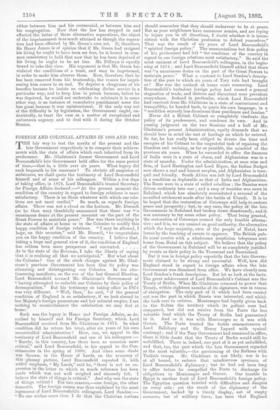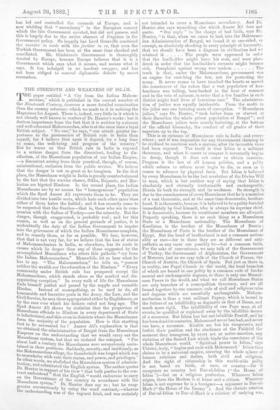FOREIGN AND COLONIAL AFFAIRS IN 1880 AND 1882.
THE fair way to test the merits of the present and the late Government respectively is to compare their achieve- ments with the state of affairs which each inherited from its predecessor. Mr. Gladstone's former Government and Lord Beaconsfield's late Government held office for the same period of time,—that is, a little over six years. What legacy did each bequeath to his successor ? To obviate all suspicion of unfairness, we shall quote the testimony of Lord Beaconsfield himself and of some of his colleagues. Within a few days of taking office, in 1874, Lord Beaconsfield's trusted Secretary for Foreign Affairs declared :—" At the present moment the condition of the country in regard to foreign relations is most satisfactory. There is no State whatever with which our rela-
tions are not most cordial." So much, as regards foreign affairs. There was not a cloud on the horizon. Mr. Disraeli (as he then was) thankfully announced that there was "a unanimous desire at the present moment on the part of the Great Powers to maintain peace." Nor was there anything in the state of affairs at home or in the Colonies to modify this happy condition of foreign relations. "I may be allowed, I hope, on this occasion," said Mr. Disraeli, "to congratulate you on the happy condition of the country. I believe that, -taking a large and general view of it, the condition of England has seldom been more prosperous and contented As to the state of the Revenue, I take the liberty of saying that it is realising all that we anticipated." But what about the Colonies? One of the stock charges against Mr. Glad- stone's previous Government has been that its policy was alienating and disintegrating our Colonies. In his elec- tioneering manifesto, on the eve of the last General Election, Lord Beaconsfield accused Mr. Gladstone's Government of "having attempted to enfeeble our Colonies by their policy of decomposition." But his testimony on taking office in 1874 was very different. "Well, then," he said, "if the general condition of England is so satisfactory, if we look abroad to her Majesty's foreign possessions and her colonial empire, I see nothing to counterbalance the satisfaction we may feel at home."
Such was the legacy in Home and Foreign Affairs, as de- scribed by himself and his Foreign Secretary, which Lord Beaconsfield received from Mr. Gladstone in 1874. In what condition did be return his trust, after six years of his own uncontrolled administration ? Here, too, we appeal to the testimony of Lord Beaconsfield and one of his colleagues :— " Rarely, in this country, has there been an occasion more critical," said Lord Beaconsfield, in his appeal to the Con- stituencies in the spring of 1880. And when some doubt was thrown, in the House of Lords, on the accuracy of this gloomy picture, Lord Beaconsfield repeated it, with added emphasis, "My Lords," said he, "there is not an ex- pression in the letter to which so much reference has been made which was not well weighed and sincerely felt. I believe the state of things is critical." And why was the state of things critical ? For two reasons,—one foreign, the other domestic. The foreign reason was thus explained by the most ingenuous of Lord Beaconsfield's colleagues, Lord Sandon :— "No one wishes more than I do that the Christian nations
should remember that they should endeavour to be at peace. But as your neighbours have enormous armies, and are trying to injure you in all directions, I doubt whether it is incon- sistent with the Christian profession to defend yourselves." That was the result of six years of Lord Beaconsfield's "spirited foreign policy." The unostentatious but firm policy of his predecessor had left "the condition of the country in regard to our foreign relations most satisfactory." So said the most eminent of Lord Beaconsfield's colleagues, in the begin- ning of 1874; and Lord Beaconsfield himself added that there was "a unanimous desire on the part of the Great Powers to maintain peace." What a contrast to Lord Sandon's descrip- tion of the pass to which six years of Tory rule had brought us Nor was the outlook at home more reassuring. Lord Beaconsfield's turbulent foreign policy had caused a general stagnation of trade, and distress and discontent were prevalent everywhere. Ireland in particular, which Lord Beaconsfield had received from Mr. Gladstone in a state of contentment and tranquillity, he handed back, to quote his own language, in a "condition scarcely less disastrous than pestilence and famine."
Never did a British Cabinet so completely vindicate the policy of its predecessor, and condemn its own. And in passing judgment on the two Sessions and a half of Mr. Gladstone's present Administration, equity demands that we should bear in mind the sort of heritage on which he entered. So far, he has really been obliged to devote the time and energies of his Cabinet to the ungrateful task of repairing the blunders and undoing, as far as possible, the mischief of the previous six years. When he succeeded to office the finances of India were in a state of chaos, and Afghanistan was in a, state of anarchy. Under the administration, at once wise and firm, of Lord Hartington and Lord Ripon, the Indian Budget now shows a real and honest surplus, and Afghanistan is tran- quil and friendly. South Africa was left by Lord Beaconsfield in a condition as deplorable as that of India and Afghanistan. The Boers were in a state of veiled rebellion ; the Basutos were driven recklessly into war and a crop of troubles was sown in Zululand, which has absolutely necessitated a reversal of the so-called settlement made after the battle of Ulundi. It is to be hoped that the restoration of Cetewayo will help to restore peace and prosperity ; but, in any case, the policy of the late Government in Zululand had broken down disastrously, and it was necessary to try some other policy. That being granted, the restoration of Cetewayo seemed the only feasible alterna- tive . and it is, we are assured on good authority, the alternative which the large majority, even of the people of Natal, have learnt by the teaching of events to approve. The British pub- lic must receive with a wholesome scepticism telegrams sent home from Natal on this subject. We believe that the policy of the Government in Zululand will be as completely justified by events as their policy in the Transvaal and Basutoland.
But it was in foreign policy especially that the late Govern- ment claimed to be strong and successful. Well, how did England stand in regard to foreign affairs when the late Government was dismissed from office. We have already seen Lord Sandon's frank description. But let us look at the facts. The great achievement of Lord Beaconsfield's Cabinet was the Treaty of Berlin. When Mr. Gladstone returned to power that Treaty, within eighteen months of its signature, was in course of abrogation. The only part of it which had been carried out was the part in which Russia was interested, and which she took care to enforce. Montenegro had loyally given back to the Sultan the territory which its gallant sons had conquered, but did not receive from the Porte the less valuable land which the Treaty of Berlin had guaranteed to it. And as it was with Montenegro so it was with Greece. The Porte treated the feeble remonstrances of Lord Salisbury and Sir Henry Layard with cynical contempt ; and if the Tory Government had remained in office, there is little doubt that the Treaty of Berlin would still be unfulfilled. There is, indeed, one part of it as yet unfulfilled, and that, too, the part which the late Government regarded as the most valuable,—the garrisoning of the Balkans with Turkish troops. Mr. Gladstone is not likely, nor is ha at all bound, to enforce that mischievous specimen of Lord Beaconsfield's diplomacy ; but he had not been long in office before he compelled the Porte to discharge its
obligations to Montenegro and Greece. Our trouble in Egypt is another fruit of Lord Beaconsfield's foreign policy. The Egyptian question bristled with difficulties and dangers on every aide; yet the result of the diplomacy of the Government, backed by a timely display, not of empty menaces, but of military force, has been that England
has led and controlled the counsels of Europe, and is now wielding that " ascendancy " in the European concert which the late Government coveted, but did not possess, and this is largely due to the entire absence of Jingoism in the Government policy. So happily has Lord Granville combined the &wife?. ia nodo with the fortiter in re, that even the Turkish Government has been at the same time checked and conciliated. Mr. Gladstone's Government is thoroughly trusted by Europe, because Europe believes that it is a Government which says what it means, and means what it says. It has indulged in no insolent swagger, and has not been obliged to conceal diplomatic defects by secret surrenders.































 Previous page
Previous page